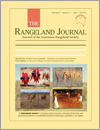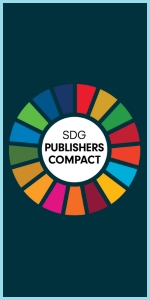
The Rangeland Journal
Volume 42 Numbers 4 & 5 2020
Special IssueResilient Future Rangelands – Integrating Environment and Livelihoods
RJv42n5_EDResilient future rangelands – integrating environment and livelihoods
RJv42n5_ED Full Text | RJv42n5_EDPDF (62 KB) Open Access Article
The biophysical and social changes facing the rangelands calls for an innovative mix of modifying existing uses and pursuing new ones to help transition into a social-ecological system in tune with environments. In the face of rising uncertainty, optimal combination of management and policy to suit some assumed future environment can’t work. A transformational change is needed. It has to be an ongoing process of exploring, learning and keeping options open, along the lines of the developing field of guided self-organisation.
RJ20051 Abstract | RJ20051 Full Text | RJ20051PDF (66 KB) Open Access Article
RJ20019Nudging the narrative: heading in the 'right direction'
Lack of engagement with rangelands by the general public, politicians and some practitioners has led to policy failure and unsustainable practice. We argue that thinking in terms of cultural reciprocity with land will lead to greater sustainability of rangeland uses. Many grass-roots initiatives are already showing the way by working at the boundary of science, society and decision makers, involving everyone with a stake in the outcome and developing genuine collaboration and acceptance of diverse value systems.
RJ20019 Abstract | RJ20019 Full Text | RJ20019PDF (147 KB) Open Access Article
RJ20040A narrative to support the future of the Australian Outback
The importance of stories for public and policy understanding means a better and more positive narrative for the rangelands is needed. We urge everyone to adopt the (Modern) Outback as a more intuitive name. We provide a set of narrative principles and an example of how to use them.
RJ20040 Abstract | RJ20040 Full Text | RJ20040PDF (71 KB) Open Access Article
RJ20031Understanding how Aboriginal culture can contribute to the resilient future of rangelands – the importance of Aboriginal core values
Aboriginal cultural concepts relating to establishing and maintaining resilience in social-ecological systems are explained through a cultural Malleefowl depiction, as it was related at the 2019 Australia Rangelands Conference.
RJ20031 Abstract | RJ20031 Full Text | RJ20031PDF (374 KB) Open Access Article
RJ20055Commentary: on the under-valuing of Australia’s expertise in drylands research and practice globally
As a dry country, Australia has contributed much good research and practice to drylands management globally for decades, with both reputational and commercial benefits. In the last decade, Australian policy has almost ceased investing in drylands policy and development internationally, undermining Australia’s leadership in drylands. Re-establishing awareness, coordination and resourcing of Australia’s drylands expertise would reap great rewards to the nation.
RJ20055 Abstract | RJ20055 Full Text | RJ20055PDF (428 KB) | RJ20055Supplementary Material (494 KB) Open Access Article
As the world grapples with pervasive disruption caused by the COVID-19 pandemic, there are considerable risks that a global health crisis will precipitate a global food crisis. Like climate change, COVID-19 amplifies existing problems and risks in food systems. In this context, Australian rangelands science and the innovation system that has evolved with minimal subsidies in Australia’s highly variable climate, are strategic national assets and an important element of Australian soft power in our region.
RJ20062 Abstract | RJ20062 Full Text | RJ20062PDF (65 KB) Open Access Article
RJ20048A call for collaboration: linking local and non-local rangeland communities to build resilience
Australia’s rangelands (the outback) support tourism, agriculture, mining, cultural values and natural environments. Populations and services are declining across the outback, undermining the future of the local people and communities. We call on visiting scientists, policy makers, influencers and other professionals to engage more with local groups and share ideas, knowledge and resources to build strong rangeland communities and regions.
RJ20048 Abstract | RJ20048 Full Text | RJ20048PDF (119 KB) Open Access Article
RJ20052Building human capacity, capability and future leaders for Australia’s rangelands
Students and young professionals are seeking guidance on the knowledge and skills required for a successful career in the rangelands of Australia. This paper meets a long-standing need for a collation of information to guide career development and build the capacity of people to research, advise and manage the natural resources and livestock-based enterprises in these regions.
RJ20052 Abstract | RJ20052 Full Text | RJ20052PDF (446 KB) Open Access Article
Carbon farming is expanding in Australia’s rangelands, driven by government incentives aimed at managing land to promote the regeneration or maintenance of tree cover. Although carbon sequestration is the primary objective, other co-benefits for biodiversity, soils and landholder income may enhance socio-ecological resilience of rangeland Australia. This paper reports on these opportunities along with potential risks to resilience that could arise from policy uncertainty, social divisions and perceived loss of future land use flexibility.
RJ20034 Abstract | RJ20034 Full Text | RJ20034PDF (831 KB) | RJ20034Supplementary Material (1.3 MB) Open Access Article
RJ20039Custodianship of wildlife on private land to support conservation – an Australian model
Australian threatened species lists continue to grow: current biodiversity conservation measures are not working. We propose a new measure that would enable landholders to have a form of ownership over wildlife on private land with an emphasis on duty of care for the species. Such changes would see an increase in biodiversity conservation, enhanced resilience in a changing climate, habitat restoration, and potentially less land clearing.
RJ20039 Abstract | RJ20039 Full Text | RJ20039PDF (847 KB) Open Access Article
RJ20068Preventing rangeland degradation: a shared problem for Australia and China
Climate change and variability increases the likelihood of grazing-stressed rangeland ‘flipping’ into less productive states, and online critical threshold forecasting would bring an important decision making tool to pastoralists and agencies. Cooperative research between Australia and China should lead to development of robust indicators and practical applications to further this goal.
RJ20068 Abstract | RJ20068 Full Text | RJ20068PDF (118 KB) Open Access Article
RJ20053Modelling Chinese grassland systems to improve herder livelihoods and grassland sustainability
Degradation of the 400 M ha of Chinese grasslands has contributed to declining livelihoods for 40 M herders and reduced regional air quality due to increased dust storms. A bioeconomic modelling approach identified that adoption of biomass-based grazing management and improved supplementary feeding would help herders meet sustainable grassland management objectives. Herders though, need to trade off different attributes to identify the system that best meets their attitude to risk.
RJ20053 Abstract | RJ20053 Full Text | RJ20053PDF (496 KB) | RJ20053Supplementary Material (540 KB) Open Access Article
RJ20033Chinese degraded grasslands – pathways for sustainability
The vast grasslands of China are degraded due to an accumulation of factors since 1949 that lead to severe overgrazing. Research, using modelling, experiments and farm demonstrations has shown that stocking rates can be halved without reducing the net incomes of the millions of herders who rely on the grasslands. A mix of policy and marketing changes are needed along with a change in herder skills as they change from survival to production systems.
RJ20033 Abstract | RJ20033 Full Text | RJ20033PDF (301 KB) Open Access Article
RJ20049Optimising grazing for livestock production and environmental benefits in Chinese grasslands
Overgrazing has extensively degraded Chinese grasslands, and a reduction in stocking rate is needed to protect vital ecosystem services. Grazing experiments in desert steppe, typical steppe and alpine meadow grasslands determined the optimum stocking rate and grazing management for each environment. In both the desert and typical steppe experiments, results were optimal under conservative stocking that maintained the average herbage mass through summer >0.5 t DM ha–1. Herbage mass was higher with conservative stocking rates in the alpine meadow.
RJ20049 Abstract | RJ20049 Full Text | RJ20049PDF (465 KB) Open Access Article
RJ20059Challenges, solutions and research priorities for sustainable rangelands
 , Mark Stafford-Smith, Graciela I. Metternicht
, Mark Stafford-Smith, Graciela I. Metternicht  , Andrew Ash, Alex Baumber, Matthias M. Boer, Sandy Booth, Don Burnside, Amber C. Churchill
, Andrew Ash, Alex Baumber, Matthias M. Boer, Sandy Booth, Don Burnside, Amber C. Churchill  , Marwan El Hassan, Margaret H. Friedel, Cecile M. Godde, Dana Kelly, Mick Kelly, John F. Leys, Sarah E. McDonald, Yiheyis T. Maru, David G. Phelps, Malcolm Ridges
, Marwan El Hassan, Margaret H. Friedel, Cecile M. Godde, Dana Kelly, Mick Kelly, John F. Leys, Sarah E. McDonald, Yiheyis T. Maru, David G. Phelps, Malcolm Ridges  , Geoff Simpson, Barry Traill, Brian Walker
, Geoff Simpson, Barry Traill, Brian Walker  , Cathleen M. Waters and Angus W. Whyte
, Cathleen M. Waters and Angus W. Whyte
Rangelands play a key role in Australia’s environmental, industrial and societal framework, with unique landscapes that cover a large proportion of the continent supporting diverse communities, industries, and a range of ecosystem goods and services. Thus, supporting resilient and sustainable rangelands that provide cultural, societal, environmental and economic outcomes simultaneously is of great value. We provide an overview of key challenges facing Australia’s rangelands and potential solutions and research activities that will help to overcome these challenges.
RJ20059 Abstract | RJ20059 Full Text | RJ20059PDF (274 KB) | RJ20059Supplementary Material (316 KB) Open Access Article




